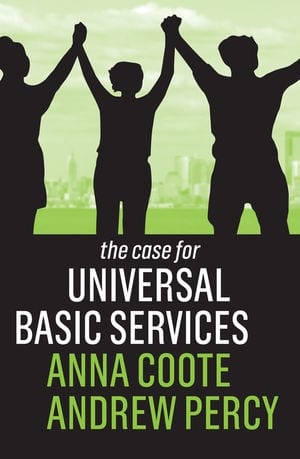The case for universal basic services
A new book out this month sets out a plan for transforming public services.
11 February 2020

The case for universal basic services, by Anna Coote and Andrew Percy (Polity)
A new book launched this week sets out a plan for transforming public services, putting people in control and establishing universal rights of access according to need – not ability to pay. It argues that we can only flourish as a society – now and in the future – if we act together and take collective responsibility to provide all of us with life’s essentials.
The case for universal basic services argues that we can build on what we’ve got, the National Health Service and schools, for example, and branch out to meet other essential needs — housing, transport, childcare, adult social care and access to digital information. These are not nice-to-haves but necessities. If anyone who needs them is unable to access them, it’s not just bad news for those individuals. We all lose in the end.
But our different needs have to be met in different ways. The book offers a principled framework, which can be applied across the range of needs and services. And which examples we can usefully pay attention to – housing co-ops in Copenhagen, universal childcare in Norway, free buses for all in Tallin, Estonia, a useful way of funding adult social care in Germany, and so on.
The UBS framework can be customised for meeting different needs, but with the same set of principles.
- We start with what people need, as opposed to what we want.
- We aim for sufficiency, not something minimal.
- Everyone has a right to have their needs met, so there’s an underpinning structure of enforceable entitlements.
- People who need services should be actively engaged in identifying what they need and how their needs can be met. We embrace the principles, developed at NEF, of democratic dialogue and co-production.
- It follows that this is not about top-down, uniform state provision, but about providing services through a range of organisations, including co-ops and social enterprises and common ownership – another idea developed at NEF. We can do this in order to promote local control and put an end to profiteering.
- The role of public institutions is transformed. National and local governments continue to provide some services, but their crucial role is to ensure equal access according to need, to set and enforce standards, to collect and distribute funds, and to support a wide range of provider organisations and to coordinate their efforts across the different sectors to get the best results.
- The funds for universal basic services are not just a matter of public expenditure, they are a vital investment of shared resources in the social infrastructure that makes all our lives possible.
This approach brings real gains in terms of equity, efficiency, solidarity and sustainability. Services are worth much more to poor households: this system is redistributive. Pooling resources and sharing risks is more efficient than one based on market transactions, where you’ve got profit extraction, vastly unequal information, moral hazard and no way of ensuring that basic needs are met. UBS draws on and strengthens solidarity. And it is a form of collective consumption that is much more sustainable – socially, economically and environmentally – than market based systems.
Is there anything radical about any of this? Yes, for at least three reasons. Because we want to reclaim the collective ideal that was at the heart of the post-war settlement – now submerged and discredited by neoliberal politics. Because UBS promotes sustainable development – a needs-based approach that is sufficient for all, across generations. And because at the heart of UBS is a mission to transform the way services are provided, to put people in control, and to build a new role for the state which nurtures these changes.
So our case for universal basic services is theoretical – based on wellbeing, capabilities and needs. It is normative – arguing that this approach is best if we want to secure greater equality, efficiency, solidarity and sustainability. And it is politically feasible, in that it is incremental, adaptable and affordable.
The idea of UBS emerged originally as a counterpoint to Universal Basic Income. We argue that an ideal policy companion for UBS is a thoroughly reformed social security system, which NEF is now working on, rather than cash payments to everyone including those who don’t need it. But the case for UBS has a life of its own. We want to get people talking and arguing about UBS as widely as possible. It’s a start, not a finish. But we think it has a promising future.
The case for universal basic services is written by Anna Coote and Andrew Percy, and is published by Polity.
Campaigns Universal basic services
Topics Public services






